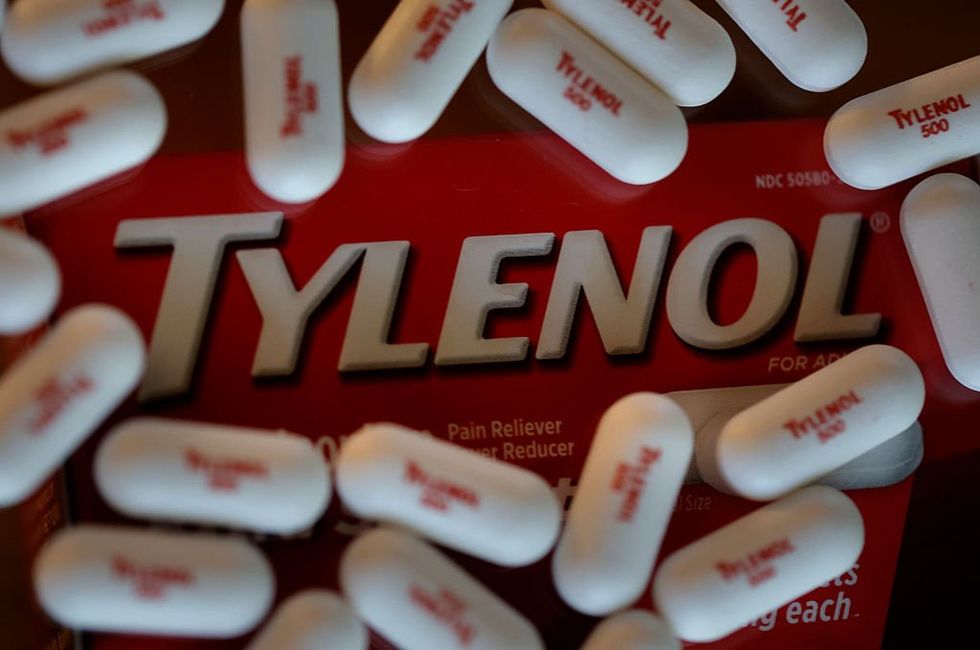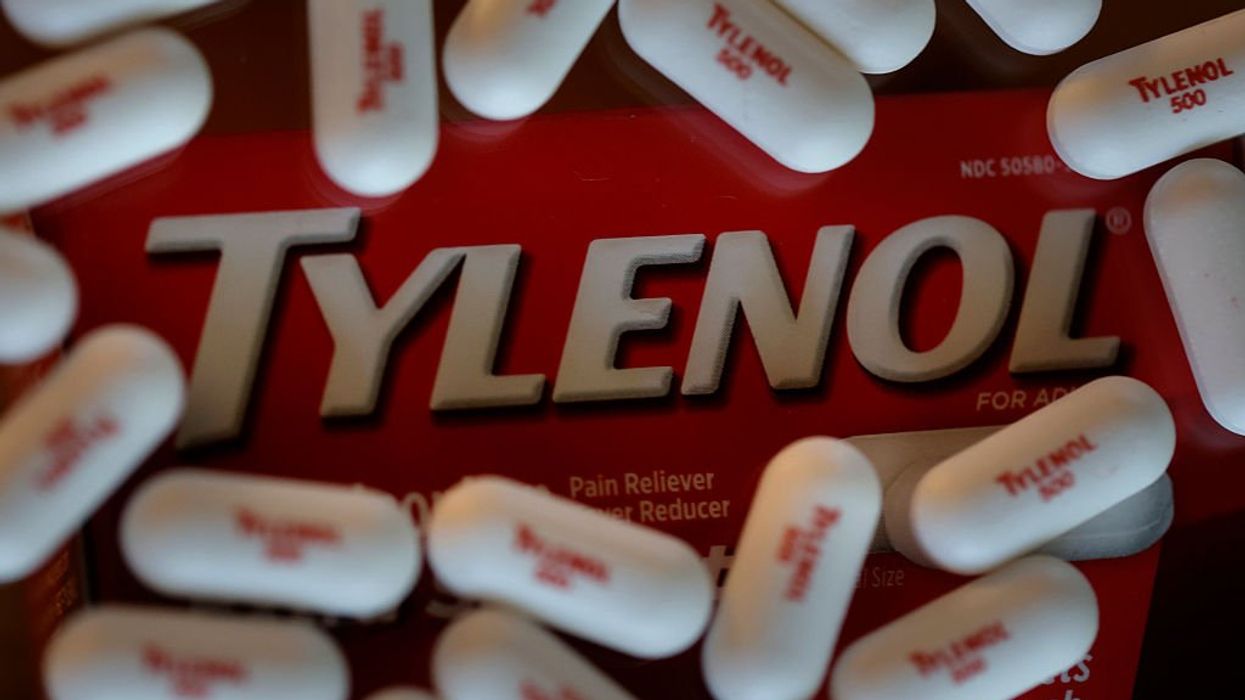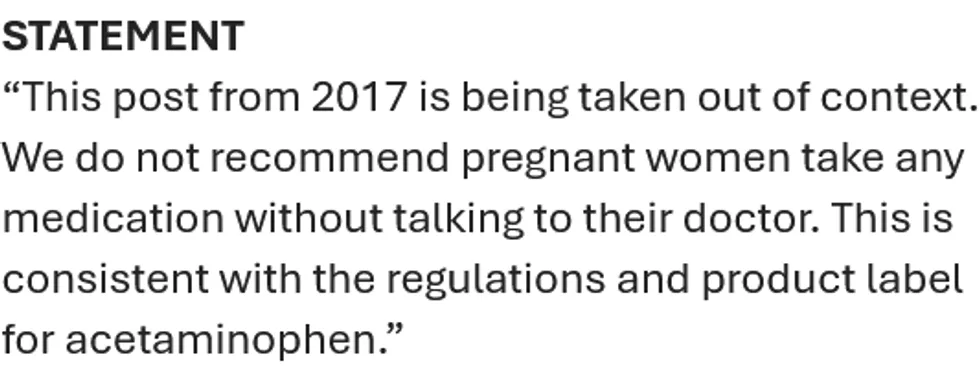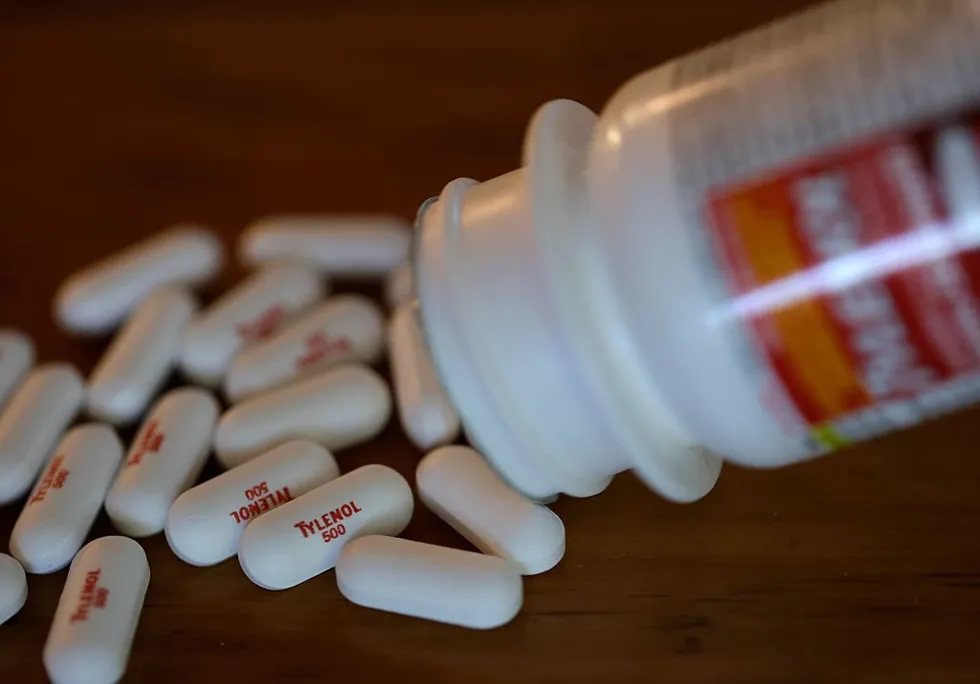Fact-check: Tylenol confirms 2017 pregnancy warning tweet is authentic


President Donald Trump and Health and Human Services Secretary Robert F. Kennedy Jr. announced on Monday that the U.S. Food and Drug Administration will notify physicians that acetaminophen use by pregnant women may be associated with a "very increased risk" of neurological conditions like autism and ADHD in children.
Live Your Best Retirement
Fun • Funds • Fitness • Freedom
This announcement prompted debate about the safety of acetaminophen, which is the active ingredient in Tylenol and the leading cause of acute livery injury in the United States.
'If pregnant or breast-feeding, ask a health professional before use.'
Amid efforts to downplay possible risks of Tylenol usage during pregnancy by medical professionals and by foreign health organizations, online sleuths uncovered old yet thematically relevant messages Tylenol apparently shared on social media. Two of those messages went viral this week.
The first tweet, which is dated June 17, 2019, states, "Congrats on your upcoming addition! SO exciting! It'd be great to touch base real quick since we haven't tested Tylenol to be used during pregnancy."
The second tweet, dated March 7, 2017, states, "We actually don't recommend using any of our products while pregnant. Thank you for taking the time to voice your concerns today."
The second tweet was reposted on X both by the White House, with an image of Trump holding a hat emblazoned with the message, "Trump was right about everything," and by the Department of Health and Human Services with the caption, "No caption needed."
— (@)
Some social media users expressed doubt that Tylenol was actually responsible for the original tweet; others seized on the tweet as validation of the president's recent warnings about taking acetaminophen; and a few claimed it was being grossly misinterpreted.
Fact: The tweet is authentic.
When asked about the tweet, a spokesperson for Kenvue, the maker of Tylenol, told Blaze News, "This post from 2017 is being taken out of context."
"We do not recommend pregnant women take any medication without talking to their doctor," continued the statement. "This is consistent with the regulations and product label for acetaminophen."
 Screenshot of correspondence with Kenvue.
Screenshot of correspondence with Kenvue.
This messaging is consistent with what appeared on the drug's warning label as of 2019.
In addition to highlighting the risk of "severe skin reactions" and "severe liver damage" if taken in excess or in conjunction with certain other substances, the packaging states: "If pregnant or breast-feeding, ask a health professional before use."
RELATED: Trump administration claims link between autism and Tylenol, greenlights remedy
 Photo Illustration by Justin Sullivan/Getty Images
Photo Illustration by Justin Sullivan/Getty Images
Similar language appeared in a Feb. 13, 2017, tweet in which Tylenol wrote, "Just make sure to talk to your doctor before taking Tylenol while you're pregnant."
When asked whether Tylenol poses an elevated risk to pregnant women and/or their unborn children and why pregnant women need to consult their doctors prior to use, a spokesperson for Kenvue, formerly the consumer health care division of Johnson & Johnson, provided the following response to Blaze News:
"The post did not address the full guidance — which has not changed:
- "Acetaminophen is the safest pain reliever option for pregnant women as needed throughout their entire pregnancy.
- "Our products are safe and effective when used as directed on the product label.
- "We recommend pregnant women do not take any over-the-counter medication, including acetaminophen, without talking to their doctor first."
Tylenol's updated frequently asked questions webpage has a section on acetaminophen and autism, which states: "Our best advice? Talk to your healthcare professional before taking or administering acetaminophen."
The FAQ also states: "Please know that there is no credible science that shows taking acetaminophen causes autism."
'The majority of the studies reported positive associations of prenatal acetaminophen use with ADHD, ASD, or NDDs in offspring.'
There has long been evidence of an association between prenatal acetaminophen exposure and neurodevelopmental disorders including autism — an association the American College of Obstetricians and Gynecologists and some of the other outfits now defending Tylenol once admitted.
For example:
- A 2013 HHS-backed study published in the International Journal of Epidemiology concluded that "children exposed to long-term use of paracetamol during pregnancy had substantially adverse developmental outcomes at 3 years of age."
- A 2017 study published in the Journal of International Medical Research said, "The bottom line is that hundreds of studies describing the epidemiology of autism and the numerous and varied risk factors for autism have a straightforward explanation: autism could be an acetaminophen-induced brain injury facilitated by oxidative stress and inflammation in newborns and young children."
- A National Institutes of Health-funded 2019 study published in the journal JAMA Psychiatry indicated that "[umbilical] cord biomarkers of fetal exposure to acetaminophen were associated with significantly increased risk of childhood ADHD and ASD in a dose-response fashion."
- A 2023 scientific review published in the Swiss journal Children concluded "without reasonable doubt and with no evidence to the contrary that exposure of susceptible babies and children to acetaminophen (paracetamol) induces many, if not most, cases of autism spectrum disorder."
- A 2024 study published in the journal Clinical and Experimental Pediatrics noted that "careful examination reveals no valid objections to the conclusion that early exposure to acetaminophen causes neurodevelopmental injury in susceptible babies and children."
- An NIH-supported systematic review published last month in the medical journal Environmental Health noted on the basis of an analysis of scores of studies regarding the relationship between neurodevelopmental disorders, including autism and attention-deficit/hyperactivity disorder, and prenatal exposure to acetaminophen, that "overall, the majority of the studies reported positive associations of prenatal acetaminophen use with ADHD, ASD, or NDDs in offspring, with risk-of-bias and strength-of-evidence ratings informing the overall synthesis."
Like Blaze News? Bypass the censors, sign up for our newsletters, and get stories like this direct to your inbox. Sign up here!
Originally Published at Daily Wire, Daily Signal, or The Blaze
What's Your Reaction?
 Like
0
Like
0
 Dislike
0
Dislike
0
 Love
0
Love
0
 Funny
0
Funny
0
 Angry
0
Angry
0
 Sad
0
Sad
0
 Wow
0
Wow
0













































































